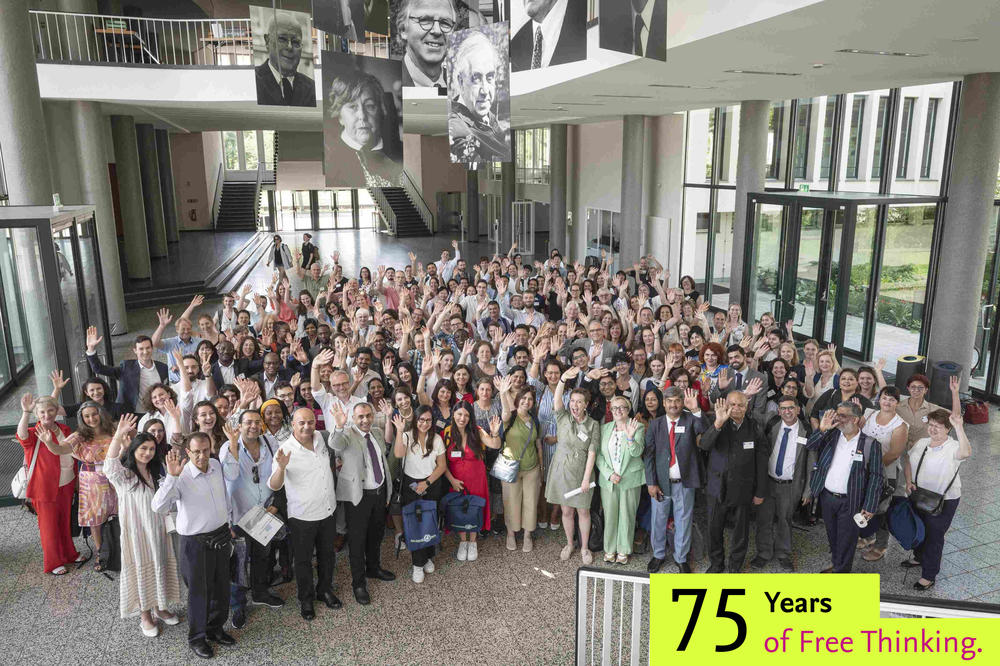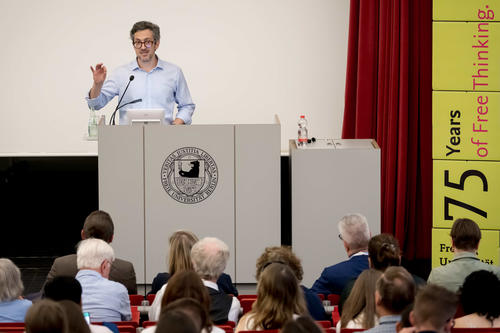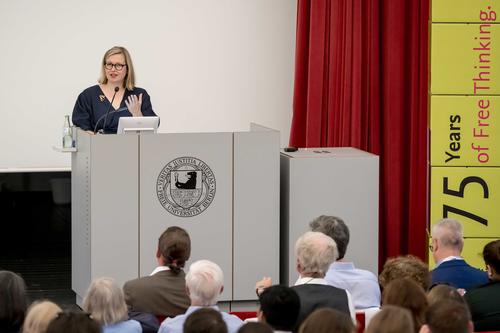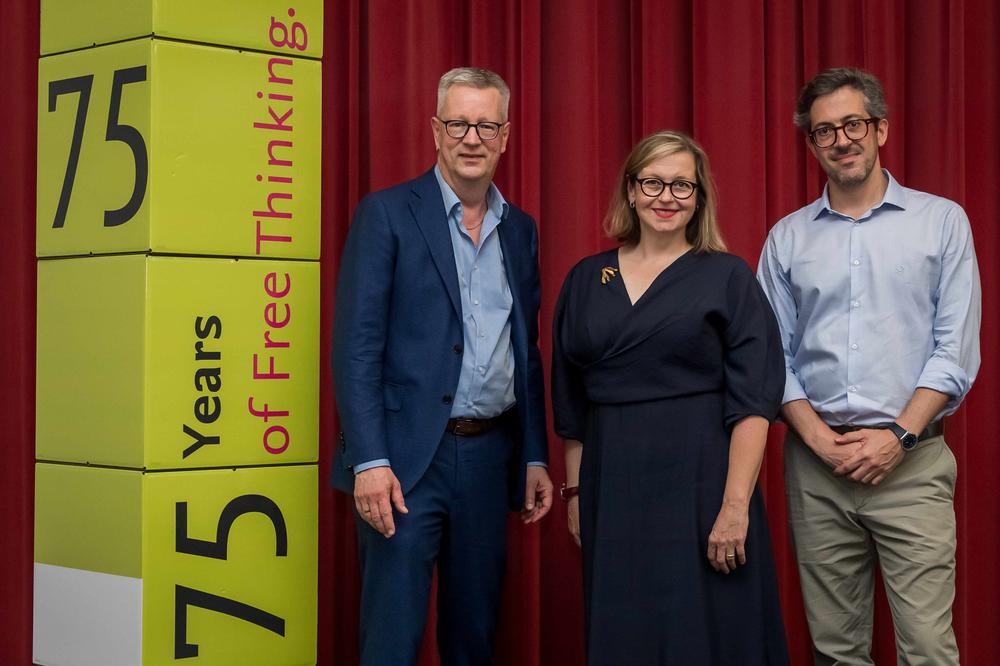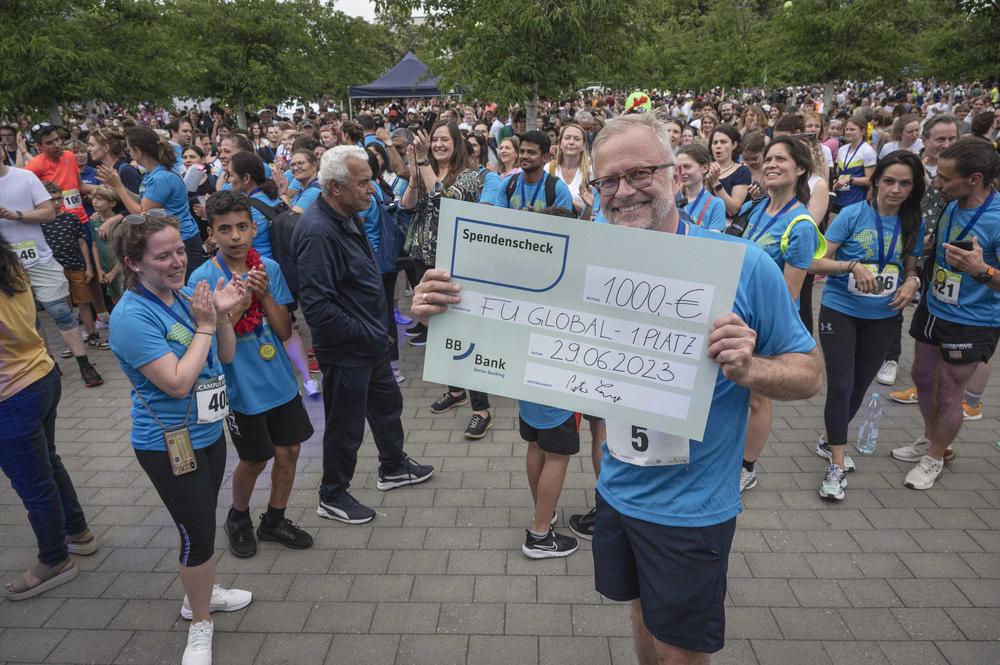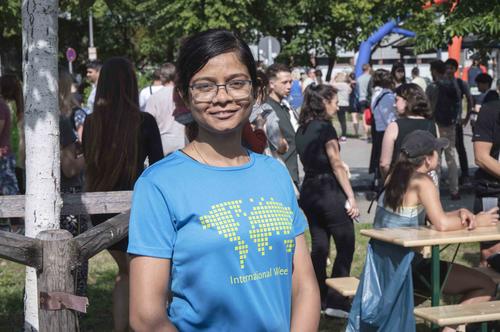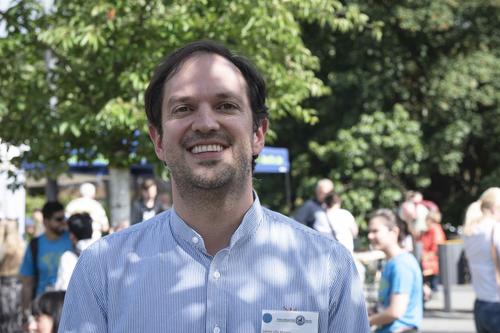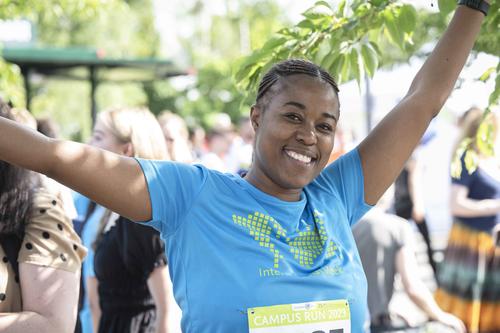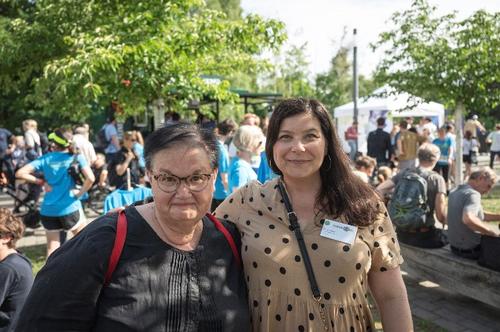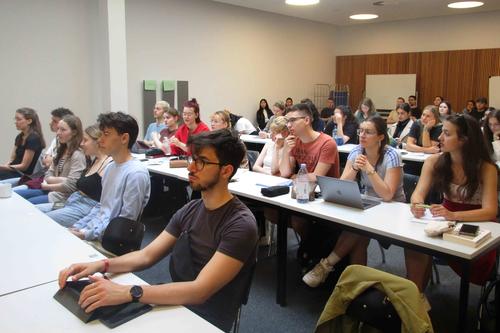Visitors from around the World Flock to Freie Universität’s Campus
Students, employees, and researchers from Freie Universität and abroad got together for International Week and Staff Training Week from June 26–30, 2023
Jul 17, 2023
A warm welcome: 143 university employees from forty countries came to Freie Universität to attend International Staff Training Week, a one-week series of special training events.
Image Credit: Bernd Wannenmacher
“It is such an honor to follow the late, great John F. Kennedy,” said Professor Günter M. Ziegler, president of Freie Universität Berlin, at the opening event to International Week, which was held in the Henry Ford Building on June 26, 2023. Footage of Kennedy’s iconic speech, which he held in front of that very building exactly sixty years prior in 1963, had just been shown to mark the anniversary.
The US president acknowledged the special role of Freie Universität in upholding freedom in a divided Germany: “The fact of the matter is, of course, that any university, if it is a university, is free. So one might think that the words ‘Free University’ are redundant. But not in West Berlin.” In his speech, he crystallized the ethos the university has followed throughout its history: “This school is not interested in turning out merely corporation lawyers or skilled accountants [...] it must be interested in turning out citizens of the world, men who comprehend the difficult, sensitive tasks that lie before us as free men and women, and men who are willing to commit their energies to the advancement of a free society.”
“Citizens of the World. Academic Freedom in a Global Perspective”
Conrado Hübner Mendes, professor of constitutional law at Universidade de São Paulo, held a lecture titled “When Democracies Cease to Defend Academic Freedom.”
Image Credit: Regina Sablotny
The two keynote speeches to mark the occasion were held under the title “Citizens of the World. Academic Freedom in a Global Perspective.” Conrado Hübner Mendes, professor of constitutional law at Universidade de São Paulo, chose to speak about “When Democracies Cease to Defend Academic Freedom.”
He described the “tragic impact” that the election of president Jair Bolsonaro in 2019 had had on Brazil’s academic landscape. Scholars who spoke out against the president, such as during the Covid-19 pandemic (which Bolsonaro had refused to acknowledge was even happening) received death threats and felt like they were being forced out of the country. It was just as difficult for scholars who had to censor themselves for fear of government repression. “As academics we have an obligation to free thinking; otherwise, democracy will be chipped away at,” said Hübner Mendes, who himself had been subject to such reprisals.
Professor Anita Traninger, who received the Leibniz Prize this year, held one of the opening speeches for International Week.
Image Credit: Regina Sablotny
Professor Anita Traninger from the Institute of Romance Languages and Literatures followed with a lecture on “The Historical Roots and the Future of Academic Freedom.” This year’s recipient of the Leibniz Prize said that any university worthy of its name must be free, and that the world of academia has historically always had an international outlook. The language of medieval Europe was Latin, as scholars from many different lands could use it to understand each other. “Universities, when they first emerged in the Middle Ages, were not linked to specific places or buildings,” said Traninger.
Academic Freedom is Not a Mere Given
She added that the willingness to look beyond one’s own borders opened up new prospects and perspectives, which has remained crucial to producing high-quality research, as every scientific work requires a critical approach, freedom of inquiry, and reasonable doubt. Every scholar had to – and still must – present their research outcomes and theories to their peers, particularly on an international level, and take their critiques on board if they wanted to make a significant contribution to science. However, critical research is often perceived as a challenge to government positions in many countries, which in turn puts scholars at risk in authoritarian contexts. That is why one of Freie Universität’s most important responsibilities has been to serve as a safe haven for academics who can no longer live without fear in their home countries.
Academics have to see themselves as citizens of the world who are part of a global community and act in solidarity with their peers. In her speech she emphasized that academic freedom is not a mere given, but something that we have to commit to every single day: “Academic freedom is a mission that is never accomplished, but a project that is always under construction.”
Professor Anita Traninger, Professor Conrado Hübner Mendes (right), and Professor Günter M. Ziegler, president of the university.
Image Credit: Regina Sablotny
“Thinking Cannot Simply Stop at the Borders of One’s Own Country”
Professor Ziegler highlighted the power of education: “A scholar or a student is someone whose thinking does not simply stop at the borders of their own country.” He added that such a person develops empathy not only for their fellow citizens, but for the whole of humanity.
From the very beginning, Freie Universität Berlin has placed an immense value on its connections to the wider world. That is why Freie Universität Berlin decided to dedicate the entire week from June 26–30 to exploring the world and organized twenty-eight events under this motto.
Team Global returned this year to take the prize for the biggest team, joined by runners who had taken part in International Week and Staff Training Week. Front and center: Dr. Herbert Grieshop, director of the Division of International Affairs.
Image Credit: Bernd Wannenmacher
Learning and Running with Team Global
International Week for university members once more coincided with International Staff Training Week. One hundred and forty-three university employees from forty countries came together to participate in this special series of workshops and educational events at Freie Universität.
Five units of the central university administration, including the Career Service, Welcome Service, University Library, Research Division, and Division of International Affairs put together six interactive programs designed to facilitate exchange and networking among university staff members from all over the world. Many of the participants also accepted the invitation to take part in the Campus Run as members of the “FU Global” team, donning matching turquoise t-shirts with a map of the world. Five participants spoke to campus.leben before the run and told us what they learned and experienced over the course of International Staff Training Week.
Satyamayee Pattnaik, Office of Global Engagement, Indian Institute of Technology Madras in Chennai, India, participated in the “Internationalization I – Erasmus beyond Erasmus” program.
Image Credit: Bernd Wannenmacher
“I learned a lot, met so many colleagues, learned about their experiences, and what each one had to offer. So many perspectives, how different universities work, how they approach challenges, and how they find solutions. Some of the universities talked about their approach to international curriculums. That was a great take away because especially working with joint master’s initiatives it is very important to make sure that the program is ready on time […] so that students can actually come and join in the academic year. And I also learned a lot about how […] different universities approach internships and how they offer summer schools to students.
My goal is to finish the five kilometers distance in the campus run. It has been a while since I last did sports. I will see if I’m fit enough. The event is lovely; it is wonderful. I see something like this for the first time. I did my master’s during Covid, so I didn’t have the chance to be part of the campus, to see students and festivals. It is probably my first campus festival.”
Developing a Prototype for a Success Matrix
Camilo Villa Moreno is head of the Research Cooperation and Networks division at the Universidad de los Andes in Bogotá, Colombia. He took part in the “Internationalization II – Managing International Networks” program.
Image Credit: Bernd Wannenmacher
“We need to discuss and develop maybe some tools that we can use to assess our networks and decide where we are successful […] or if we should put more emphasis in some of them. This was part of the discussion and it was very interesting to see that there are similarities with our colleagues and that we can work together to develop some of these tools. We prototyped a success matrix this week, after many discussions. The idea is that within a matrix we list different criteria and then we evaluate if we are successful within a network considering those criteria. We use different kinds of indicators, for example, research collaborations happening thanks to a network or student mobility. There are also more informal, qualitative criteria such as the new connections and links that we establish thanks to a network or the visibility we gain through a network. We had an interesting workshop about conflict resolution within networks, but with very practical tools for our daily jobs. In addition to these topics it is always great to meet so many people from different universities and different places. The networking part is key and I can only recommend it to colleagues from international offices and from other offices.”
Making Universities More Attractive to New Staff
Imelda Nerongo, senior human resources practitioner at the University of Namibia in Windhoek, participated in the “Welcome Service, Personnel Development & Continuing Education: Onboarding and Staff Retention” program.
Image Credit: Bernd Wannenmacher
“I’m so excited to be here. We have gone through a lot of programs and learned a lot from each other. As human capital practitioners we experience the same type of problems. There are different experiences and different challenges and from that we learn that we can resolve our problems internally. There are things that we do well and there are things that we can learn from each other. We are trying to digitalize our things and therefore hire staff from all over the world.
During this week I learned that we have to establish systems to appeal to our staff members. Retention as well as attracting them. The onboarding process for every staff member needs to be so good that the person would want to stay. We need to make the experience worthwhile for every staff member.”
Creating More Opportunities for Exchange
Kaisa Haapa-aho, development manager, University Library at Tampere University, Finland (left) and Minna Arekhau, human resources specialist, University of Helsinki, Finland (right).
Image Credit: Bernd Wannenmacher
Kaisa Haapa-aho, development manager, University Library at Tampere University, Finland (left) participated in the “Libraries’ Shift to Sustainability: Managing Ecological and Institutional Changes” program:
“The content of this week is especially interesting because there was a track about sustainable libraries. That is one very important question that we all have to look at. When I get back to work, the most important thing I learned is to make priorities. But we should find out what is the first step. We buy a lot of books, printed books and e-books. Which ones are more sustainable? Counting, making measurements of things that we don’t take into account yet. How to make this visible in the future.
The festival looks wonderful. The weather is wonderful, people are happy. This is also a takeaway from this trip: We should have more opportunities for staff and students to mingle and to get to know each other as human beings.”
Minna Arekhau, human resources specialist, University of Helsinki, Finland (right), participated in the “Research Support: Diverse and Open Career Paths for Postdocs in Academia and Beyond” program:
“I work as a HR specialist in our recruitment and employer branding team and I specialize in academic recruitment and academic career paths and career modules. During this week we were sharing best practices and ideas and we were collectively building our knowledge around […] supporting post doc careers within and outside of academia. It is always lovely to discuss with colleagues of different universities and see what background and framework they have. A big takeaway from this week are the contacts to the people in different universities that do the same things. We can keep in contact later on and do benchmarking and compare notes around the subjects we work with.”
Direct Exchange with Over 100 Universities across the World
Students who wanted to look into studying abroad went to Go Out Day during International Week.
Image Credit: Annette Leyssner
“Don’t Fancy Sticking Out Another Winter in Berlin?” Students encouraged by the prospects advertised on this poster attended Go Out Day, an informational event for students who are thinking about studying abroad.
Freie Universität Berlin has its own exchange programs and also participates in programs such as Erasmus+. Another important topic for students is of course funding opportunities. Head of Student Mobility Gesa Heym outlined the possibilities to the attendees.
If you would like a place on a direct exchange program, then the world is your oyster, as Freie Universität Berlin has partnerships with over one hundred universities around the world. “Getting a place on a direct exchange program means that your enrollment fees at the partner university will be waived and you can get grants for living expenses and free accommodation,” says Heym. You can find more information online. The majority of countries you can do a direct exchange in are outside of Europe, as all exchanges within Europe are conducted via the Erasmus+ program.
Test Your Proficiency at the Language Center for Free
Freie Universität Berlin has over 2,500 places on foreign exchange programs in total. “But not everyone can go to Columbia University in New York,” explains Heym. She instead advocates for students to be open and to consider countries that would not immediately be on their radar when they are thinking about going abroad, like North Macedonia and Liechtenstein. It is important to have mastered the language of the country you are hoping to be sent to, although the specific requirements may vary from university to university. You can have your language proficiency tested for free at the Language Center. Heym adds: “It’s essential that you’re able to perform to the same level in the classroom while you’re abroad.”
Students took this opportunity to get an overview of the opportunities available to them. Twenty-year-old Leia, a student in her second semester at the John F. Kennedy Institute for North American Studies, was impressed by the number of partner universities Freie Universität has. “I definitely want to go to North America. I’m going to learn more about the universities so that I can find one that best suits my needs,” she says.
Next Stop: Seoul
Lasse Borgmann, who is twenty-one years old, has been dreaming of going on an exchange to Seoul. He is in the second semester of his degree program in Korean studies and East Asian studies – the perfect time to start making preparations to go on an exchange in the fifth or sixth semester. “Seoul is my ideal city for an exchange, but I’m flexible,” says Borgmann.
This is precisely what Heym likes to hear, as flexibility is often the key to snagging a place on a study abroad program. She also points to the fact that Freie Universität Berlin is particularly interested in making it feasible for students “who have fewer opportunities” to spend time abroad. This includes students who have children, those who have a disability or chronic illness, as well as people who are the first in their family to go to university. Additional funding is available for students who fall into these categories.
If you happen to be a student in a situation similar to those described above or would like to clear up any questions you might have about topics such as visas, then you are welcome to get in touch with the Student Mobility Office to arrange a consultation.
The original German version of this article appeared in campus.leben, the online magazine published by Freie Universität Berlin.

